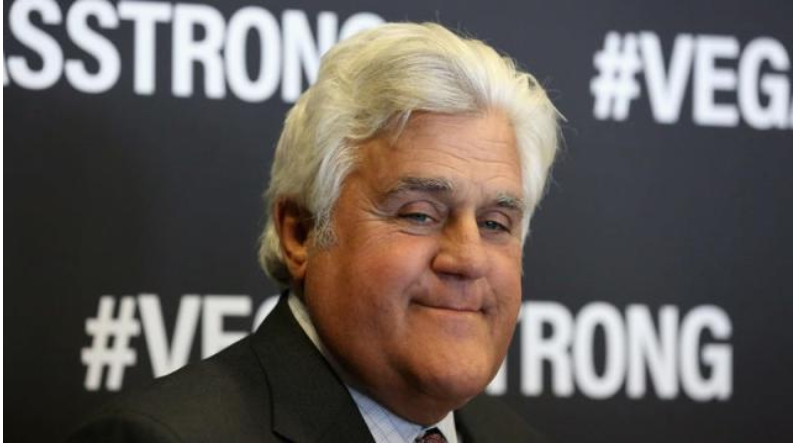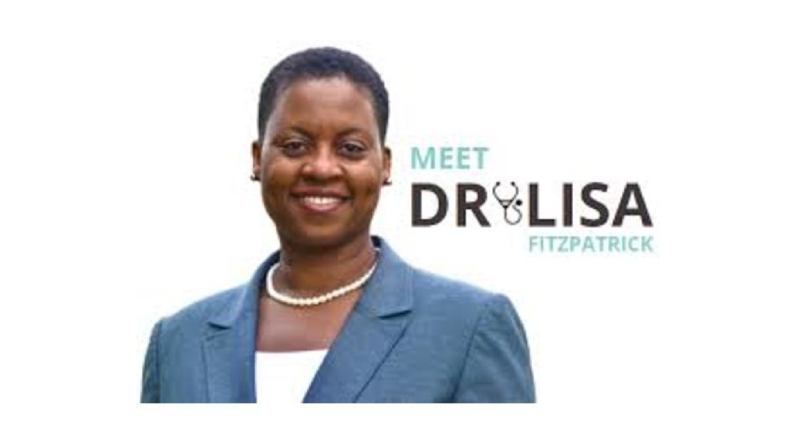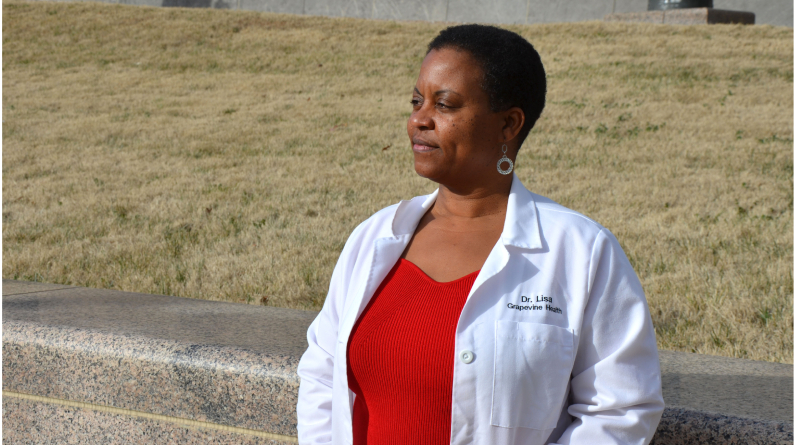All of Dr. Lisa Fitzpatrick’s adult life has been spent fielding inquiries about health care, and not just from her patients.
“When I went to the doctor, my family and friends would text me as soon as they left the office to tell me, “Here’s what he said.” You know, like, “what the heck does that mean?”” Quote from Fitzpatrick:
She has seen firsthand the consequences of patients not being able to communicate with or trust their doctor over the course of her decades-long career in government, academia, and hospital medicine. According to her, African-Americans are disproportionately affected by this issue because they have more distrust in the medical system and consequently have poorer outcomes across the board, from maternal mortality to mental health to life expectancy.
Fitzpatrick has long held the view that these gaps could be closed if the healthcare industry did a better job of communicating complex concepts in plain language.
Early in her career, she discovered she had a knack for simplifying intricate concepts in the medical field. Not only is she a doctor, but as a Black woman, her friends and family often put more faith in her than in their own white doctors.
Fitzpatrick remarked, “If you don’t understand something, it can be very scary.” “When you’re anxious, you put things off. In the worst case, it can even be fatal to a person’s health.”
Fitzpatrick reflected on this question frequently during her formative years as a doctor and during her training.
Because of this, she established Grapevine Health, a company that produces educational videos about health issues such as hypertension, kidney disease, and Medicaid enrollment and retention featuring Black physicians and other doctors of colour.
Grapevine has signed contracts with two Medicaid managed-care plans and one public employee health plan in the Washington, DC area in the past 20 months, and Fitzpatrick is in talks with four national insurers about creating content for them.
According to Fitzpatrick, “Grapevine can serve as a conduit between the member and the health plan.” “People can be helped by our efforts to explain. Any inquiries can be answered by us. We have the ability to calm nerves.”
An improbable source of inspiration
For over 15 years, ever since her time as a medical epidemiologist at the CDC and a professor at Howard University College of Medicine, Fitzpatrick has been considering how to expand access to reliable, easy-to-understand medical information.
It wasn’t until 2013 that she was working as a hospital administrator in Washington, DC that she realised how it could be done. Like many innovative approaches to healthcare, it had its origins in satire.

“I was watching Jay Leno Jaywalking one day,” Fitzpatrick recalled.
The iconic segment involved Leno going out on the streets of Los Angeles and asking random people questions about geography, history, and politics, with the predictable result that the people would fail miserably.
“It served its educational purpose while also being enjoyable. What if I can achieve the same results in terms of health, I wondered? “…she explained.
A few months later, Fitzpatrick met a cameraman at a local bike club and they set out to the National Mall in Washington to interview and inform people about the flu. They cut together some clips and uploaded them to YouTube. A similar video was made about the potential pitfalls of communicating with your doctor about your diabetes.
The series was titled “Dr. Lisa on the Street” by the creator.
According to Fitzpatrick, “people in the community loved it.” “And yet, they still wanted more. They suggested topics, asking if you could make a video on those.”
Fitzpatrick never poked fun at the people she interviewed, unlike Jay Leno. No jokes were made, just a patient, understanding explanation.
In particular, Fitzpatrick recalls one woman who hovered nearby as they filmed in the vicinity of a medical facility. She had just been released from the hospital after being treated for a blood clot in her lung, but she reported to Fitzpatrick that she was having trouble breathing and didn’t know what to do next.
“She was nervous, but there were no further instructions in her discharge paperwork, as stated by Fitzpatrick. Like a total stranger on the street, she turned to me and asked, “What do I do now?””
After talking to the woman for 30 minutes, Fitzpatrick was left bewildered when she abruptly left.
“I was extremely depressed,” she confessed. “Despite all of the rhetoric about wanting to help those in need, I couldn’t help but feel frustrated that so many people still feel ignored. In their minds, they are completely alone. Also, I don’t see any justification for that, given how much money we’re spending on medical care.”
The health care system was failing to provide people, especially Black people, with the information they needed, and that was part of the reason why people were suffering. That woman and the others Fitzpatrick met on the street helped crystallise this fundamental but often invisible problem.
So she kept making videos, but “Dr. Lisa on the Street” was still something she fit in between board meetings and grand rounds until March 2019.
The decision to “jump” was made spontaneously, as Fitzpatrick explained.
She is familiar with the setting in which we find ourselves.
Fitzpatrick resigned from her position as Chief Medical Officer of the District of Columbia’s Medicaid programme to found Grapevine Health, which now produces “Ask a doctor” videos in English and Spanish with a variety of health providers of colour who answer questions from the general public. Fitzpatrick left her posh downtown Washington condo for the lower-income neighbourhood of Congress Heights. She realised the magnitude of the problems facing many people because she lived among them.
“Because of the trauma, [they are] under constant stress. Also, I’m not referring exclusively to robberies or shootings. I’m talking about just the trauma associated with being poor, living in scarcity, having to fight for everything,” she said. Is your health really that important if it’s not causing you any discomfort right now?

As a result, Fitzpatrick found it easier to formulate messages she hoped would reach people like Yvonne Smith, 70, despite all their stress and trauma.
Smith, who resides only a few minutes away from where Fitzpatrick now resides, claims that Grapevine Health and Dr. Lisa are the “best kept secret that I wish everyone knew about.”
In early 2020, when Smith first met Fitzpatrick, Grapevine Health was a small, determined company still looking for its big break. The growing COVID-19 pandemic, however, presented an opportunity for Grapevine.
Fitzpatrick shared videos about COVID on Grapevine’s social media and provided online information sessions to local groups like the senior centre Smith frequented. Smith valued Fitzpatrick’s straightforward explanations and helpful recommendations.
“The world in which we are living is familiar to her. As she is well aware, there is only one convenience store in the entire “In the words of Smith. “For this reason, she is sensitive to the fact that it may be challenging for you to acquire the health care supplies you require. On the other hand, her recommendations would be practical and easy to implement.”
Smith says the videos she watched from Fitzpatrick and Grapevine were instrumental in lowering her blood sugar below the diabetic range, learning she was at risk for heart failure, and leading her to alter her relationship with her doctors.
“Usually, I focus on asking the doctors three questions. Incredulous, I wonder, “What is wrong with me?” Can you please lay out our strategy? I was wondering, “Is there anything else I should know that you left out?” In order for me to mentally hear her voice, “According to Smith.
It has attracted the attention of insurance companies.
To convince insurance companies to take a chance on her young company, Fitzpatrick discusses the positive effect Grapevine has had on Smith’s health. Medicaid managed-care companies, private health plans that states pay to cover roughly 70% of Medicaid beneficiaries nationwide, are her primary area of research.
Also Read :For the seventh year in a row the University of Iowa has produced the most Fulbright U S
Only 30-60% of members in Medicaid managed-care plans actually receive regular communications, according to a recent report. Lack of participation can result in patients skipping checkups, missing out on vital screenings, and failing to keep their chronic conditions under control, all of which can worsen their health.
Compared to their white counterparts, African-Americans in the District of Columbia are seven times more likely to develop diabetes and more than twice as likely to die from heart disease while receiving Medicaid.
Director of marketing for AmeriHealth Caritas DC, which serves 120,000 District of Columbia Medicaid recipients, Keith Maccannon admitted, “Frankly, many of the things that we’ve been doing haven’t been working.” Maccannon said that only about one-quarter of members answer the phone when they call to remind them to schedule appointments.
In addition to encouraging healthy behaviours, health insurers stand to gain financially from greater member participation. If not enough people in a plan get screened for certain conditions, or if too many people end up in the hospital, the plan could be penalised financially.
AmeriHealth Caritas DC was the first health insurance provider to partner with Grapevine Health in 2021 in an effort to strengthen member relationships.
According to Karen Dale, CEO of AmeriHealth Caritas DC, “once we connected, it was like kindred spirits.” This was Fitzpatrick’s takeaway from her first meeting with her.
“I want you to change your perspective and the way you do things, she was essentially saying. Allow me to assist you with that.”
One of Grapevine’s first tasks will involve assisting diabetic members of AmeriHealth Caritas DC. Patients who comply with the insurer’s recommendations were interviewed, as were those who did not. They then used this data to create videos that they hope will encourage more people to take preventative measures, and this is where Fitzpatrick and her team really shine. The final step is to send the videos via text message to members of AmeriHealth Caritas DC and assess the degree to which they increase engagement, improve outcomes, and reduce healthcare costs.
Fitzpatrick emphasised that not everyone who watches a Grapevine video will immediately make the healthiest choice for themselves. As effective as Grapevine is, it cannot solve all of the problems that people face.
In contrast, Fitzpatrick will have evidence to present to other health plans if these videos improve people’s health and save AmeriHealth Caritas DC money. She has pitched around 20 insurers, and according to her, the majority of them have declined, citing the company’s infancy and lack of track record as reasons.
She concluded, “To me, it is so clear that all roads lead to reliable health information and an appreciation of health and healthcare.” However, the difficulty lies in making it clear to everyone else.
